Heat Pump Installation, Repair & Service
“Heat pump” is a misleading name.
While a heat pump warms a building like a furnace, it also cools. It replaces a packaged air conditioning unit.
Why bother, then? Why not install packaged air conditioning instead?
Because Orange County’s mild, dry climate is perfect for heat pumps, which heat and cool with remarkable efficiency.
Orange Coast Plumbing installs, repairs, and maintains all heat pump brands. Please call us for a free estimate.
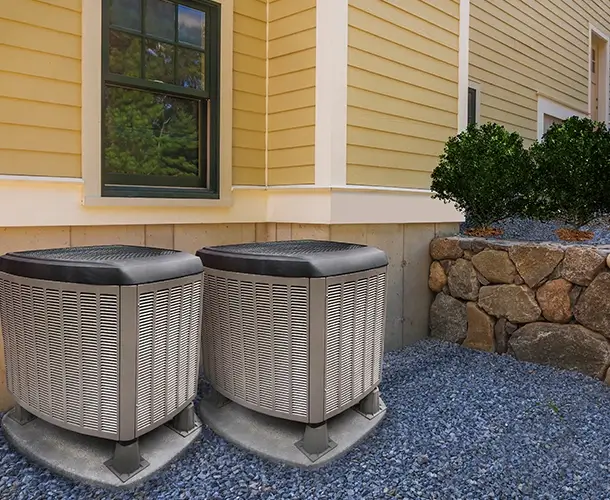
What Is a Heat Pump?
A heat pump is an appliance that moves heat from one place to another. It adds or removes warm air in a building by heat transfer.
Both heat pumps and air conditioners use a refrigerant system to transfer heat. But there are some key differences.
Heat Pump vs. Air Conditioner
- Heating and cooling capabilities: A heat pump can heat and cool a space, whereas an air conditioner can only cool. A heat pump does this by reversing the refrigerant flow in the system.
- Source of heat: A heat pump can use outdoor air, indoor air, or the ground as a heat source, depending on the operation and the type of heat pump installed. In an air conditioner, the heat source is always the room or space being cooled.
- Compressor operation: Heat pumps and air conditioners have different types of compressors to move refrigerant through the system. Heat pumps typically have a scroll or rotary compressor, while air conditioners have a reciprocating compressor (similar to a refrigerator’s compressor).
- Efficiency: Heat pumps require less energy to move the same amount of heat as an air conditioner.
How Does a Heat Pump Work?
A heat pump uses a refrigerant to absorb heat from the air or ground outside a building and transfer it inside. To cool the same areas, it reverses the process.
Heating mode
- The heat pump extracts heat from the outside air or ground and transfers it inside the building through the evaporator coil.
- The refrigerant inside the coil evaporates, absorbing heat from its surroundings.
- The refrigerant is compressed and sent to the condenser coil inside the building.
- The refrigerant releases absorbed heat and condenses back into a liquid.
- The liquid returns to the evaporator to repeat the cycle.
Cooling mode
- The heat pump extracts heat from inside the building and transfers it outside through the condenser coil.
- The refrigerant releases the heat and condenses back into a liquid.
- The liquid returns to the evaporator to repeat the cycle.
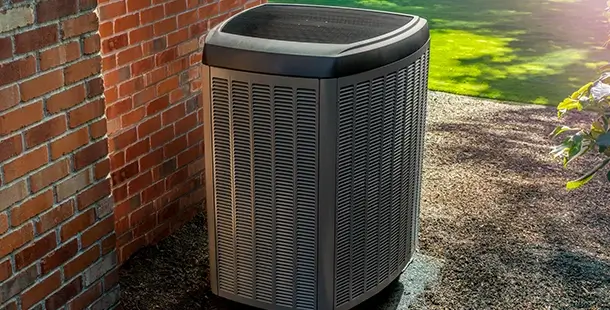
Benefits of a Heat Pump
- Energy efficiency: Heat pumps are highly efficient and can provide several units of heating or cooling energy for every unit of electrical power used.
- Versatility: Heat pumps offer heat and cooling in one system, making them a convenient solution for heating and cooling.
- Environmentally friendly: Heat pumps don’t burn fossil fuels. They’re more energy efficient than standard HVAC systems, which helps to reduce their carbon footprint.
- Quiet operation: Many heat pumps are designed to operate quietly, which makes them ideal for homes, offices, and other spaces where noise levels are a concern.
- Long lifespan: Many heat pumps have a longer lifespan than HVAC systems and a lower total cost of ownership over time.
- Improved indoor air quality: By circulating and filtering fresh air from outside, heat pumps can improve indoor air quality and reduce the levels of allergens, pollutants, and other harmful particles.
- Improved comfort: Heat pumps can provide a more comfortable indoor environment with their ability to control temperature and humidity levels.
- Increased property value: Installing a heat pump can increase the value of your property and make it more attractive to potential buyers.
Orange County: An Ideal Climate for Heat Pumps
Orange County, California, has a moderate Mediterranean climate characterized by warm, dry summers and mild, wet winters.
The optimal operating range for a heat pump is between 41°F to 95°F — roughly, depending on the type and model your choose.
For air conditioning, the balance point for most heat pumps is between 95-105°F. However, some high-performance heat pumps can provide cooling even in higher temperatures.
A heat pump is most efficient for heating when outdoor temperatures are between 41°F and 77°F. But even below 25°F, a heat pump will still run with reduced efficiency.
In Orange, CA, January temperatures range from the mid-40s to the low 70s. September temperatures typically range from the mid-60s to the low 90s. A heat pump will excel in those conditions.
- Mild temperatures allow heat pumps to work effectively in heating and cooling modes.
- Low humidity levels in Orange County make it easier for heat pumps to transfer heat from one place to another.
- Relatively stable temperatures help to maintain consistent performance and efficiency.
- Abundant sunlight can be a heat source for ground-source heat pumps.
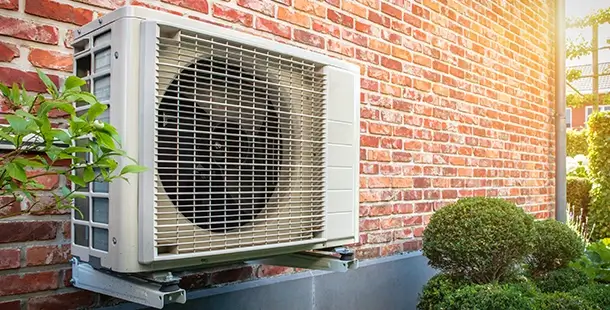
Signs Your Heat Pump Needs Repair
Here are some common symptoms of heat pump malfunction:
- Strange noises coming from the unit
- Poor heating or cooling performance
- Reduced airflow
- Inadequate heating or cooling
- High energy bills
- The unit frequently turns on and off
- The thermostat doesn’t function properly
- Poor indoor air quality; unpleasant odors
- Leaking refrigerant
- Frozen evaporator coils
- Short cycling or frequently tripping the breaker
If you experience any of these problems, call a professional HVAC technician to inspect your heat pump system.
Repair vs. New Heat Pump Installation
The decision to repair or replace a heat pump should be based on a cost-benefit analysis, considering the system’s age and condition, the cost of repairs, and the potential energy savings from a newer, more efficient model.
- Age of the system: If your heat pump is over 10-15 years old, it may be time to replace it.
- Cost of repairs: If the repair bill is high and the heat pump is near the end of its lifespan, you’ll be better off with a new, fully warranted heat pump.
- Energy efficiency: A newer, more energy-efficient model will save you money in the long run.
- Frequency of repairs: If repairs are becoming more frequent and expensive, a new heat pump will end the money drain and give you peace of mind.
- Comfort: If your heat pump no longer provides adequate heating or cooling, a new high-performance heat pump may be what you need.
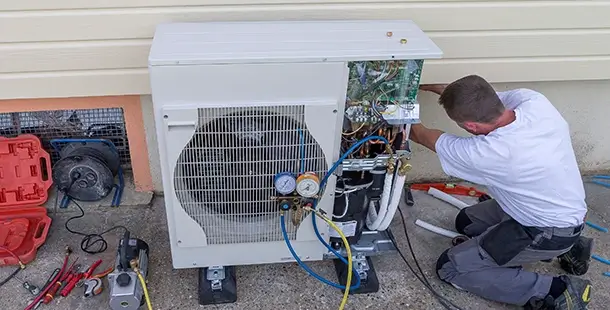
Ductless Heat Pump Installation for Homes without Ductwork
A ductless heat pump, also known as a mini-split heat pump, has an outdoor unit connected to one or more indoor units through a small conduit.
It provides efficient heating and cooling without the need for ductwork, making it ideal for retrofitting older homes, additions, or other spaces where installing ducts would be impractical or prohibitively expensive. The individual indoor units allow for temperature zoning in different rooms.
Pump Service & Repair
Like any appliance, a heat pump needs regular service for several reasons.
- Improved efficiency: Regular maintenance will improve your heat pump’s efficiency, resulting in lower energy bills and reduced wear and tear.
- Extended life span: By regularly cleaning and tightening components, replacing worn parts, and checking for refrigerant leaks, you can extend the life of your heat pump.
- Improved indoor air quality: Replacing air filters and cleaning the unit’s air handler will improve indoor air quality, reducing allergens and other airborne contaminants.
- Safety: Regular maintenance ensures that your heat pump operates safely, with no risk of electrical shock fire hazards.
- Improved comfort: Keeping your heat pump tuned and calibrated ensures smooth operation and consistent heating and cooling throughout your home.
Orange Coast Plumbing’s certified HVAC technicians have the training, experience, and tools to diagnose and repair any heat pump issue. We also offer replacement services if your current system is at the end of its life cycle or needs major repairs that would cost more than replacing it with a newer model.
Our team will troubleshoot your heat pump, give you an honest assessment of its condition, and either repair it or give you a free estimate for replacing the unit.
We guarantee our work. We’re committed to your satisfaction. And we’re available 24 hours a day, seven days a week, to respond quickly to any emergency repair.
Please contact us for more information about our heat pump services.
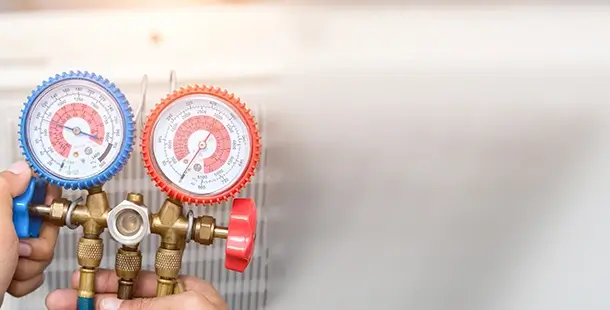
Frequently Asked Questions about Heat Pumps
How does a heat pump compare to a traditional furnace in terms of energy efficiency?
Heat pumps tend to be more energy efficient because they don’t generate heat but rather transfer heat from one location to another.
Heat pumps also provide both heating and cooling, which is more efficient than using separate systems for each. Additionally, heat pumps have a higher Seasonal Energy Efficiency Ratio (SEER) rating than traditional furnaces, meaning they use less energy to produce the same amount of heat or cooling.
However, in frigid climates, a heat pump is much less efficient.
Can a heat pump be used in cold climates?
Yes, but low outdoor temperatures impact a heat pump’s performance. Heat pumps rely on the transfer of heat from the outside air to the inside, so when temperatures drop, the heat pump has to work harder to produce the same amount of heat.
In extremely cold climates, you may need a supplementary heating source, like a furnace or electric heating elements.
What are the different types of available heat pumps?
- Air-source heat pumps: Air-source heat pumps use outside air as a heat source in the winter and as a heat sink in the summer. They’re the most common type of heat pump.
- Geothermal heat pumps: Geothermal heat pumps use the constant temperature of the earth as a heat source and heat sink. They’re more energy efficient than air-source heat pumps and will work in almost any climate, but they require a ground loop, which can be more expensive to install.
There are also several subtypes of heat pumps, including ductless mini-split heat pumps, ground-source heat pumps, and absorption heat pumps. Each type has unique benefits and limitations, so it’s important to consult with a qualified HVAC professional to determine which type is best for your needs.
How often does a heat pump need to be serviced?
Heat pumps should be serviced annually, typically before the heating or cooling season starts. This helps ensure that the heat pump is operating at peak efficiency and can help prevent breakdowns and extend the life of the unit.
During a routine maintenance visit, a qualified HVAC technician will perform a thorough inspection of the heat pump, clean its components, tighten connections, check refrigerant levels, and replace any worn parts.
Can a heat pump be used with a solar panel system?
Yes, in this setup, solar panels provide a portion of the energy to power the heat pump, lowering your energy bills and reducing your carbon footprint.
Can a heat pump be used in combination with a traditional furnace?
Yes, this combination is known as a hybrid heating system. The heat pump provides primary heating, while the furnace acts as a backup or supplementary heating source. The furnace kicks on only when the heat pump is unable to provide enough heat, typically in extremely cold temperatures.
What's the difference between a ductless heat pump and a central heat pump?
- Ductless heat pump: A small, wall-mounted unit that provides heating and cooling to individual rooms or zones in a home. It consists of an outdoor unit that is connected to one or more indoor units through a small hole in the wall. Ductless heat pumps don’t require ductwork, making them ideal for homes without existing ducts or for people who want to add heating or cooling to a specific area without having to retrofit their entire home with ducts.
- Central heat pump: A single, centralized unit that provides heating and cooling to an entire home through a system of ducts. Central heat pumps are typically larger and more powerful than ductless heat pumps and are best suited for homes with existing ductwork.
Are there any government incentives for installing a heat pump?
- Federal tax credits: In the United States, the specifics of credits can change from year to year. Check the US Department of Energy website or consult with a tax professional for the latest information.
- State rebates: Many US states offer rebates for installing energy-efficient heating and cooling systems, including heat pumps. The specifics of these rebates vary by state.
- Utility company incentives: Some utility companies offer rebates or other incentives for installing energy-efficient heating and cooling systems.
For more information or to schedule an appointment, please call us today.
Heat Pump Experts
We ensure that your heat pump works perfectly to regulate the temperature inside your space in any season, cost-effectively. Our professionals are licensed and trained to maintain and install any type of heat pump at your business or residential building. We have well-equipped vehicles that are ready for any heat pump emergency 24/7. By using industry-leading practices and tools, we deliver outstanding heat pump services in Orange County, CA.
Call us now to deal with your heat pump emergency in Orange County, CA!
